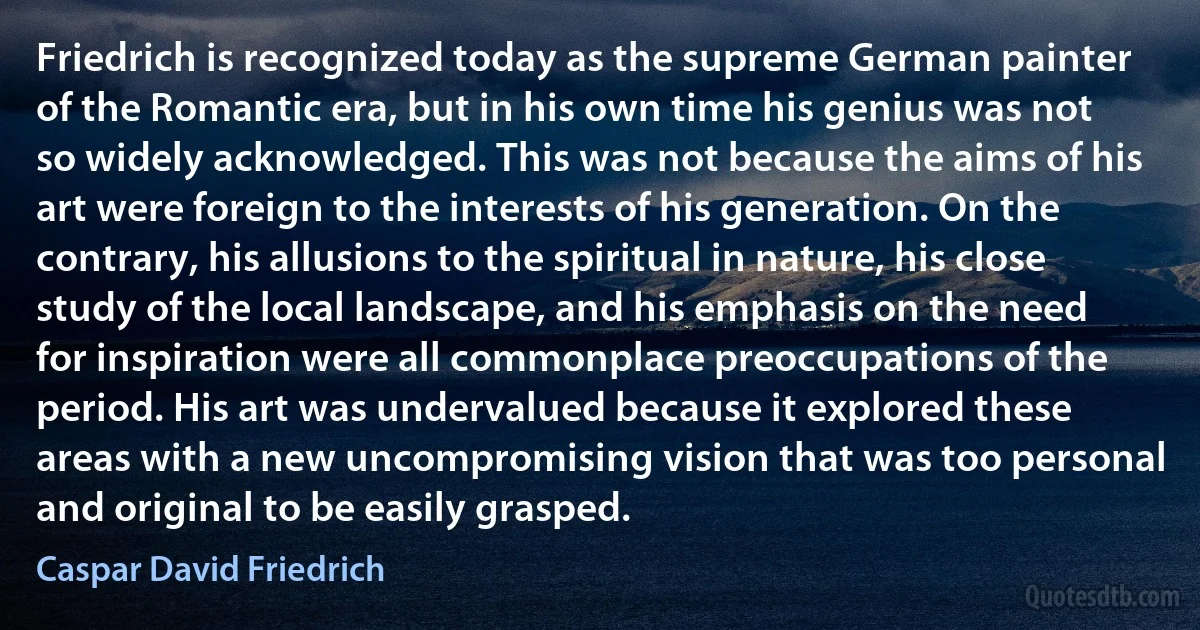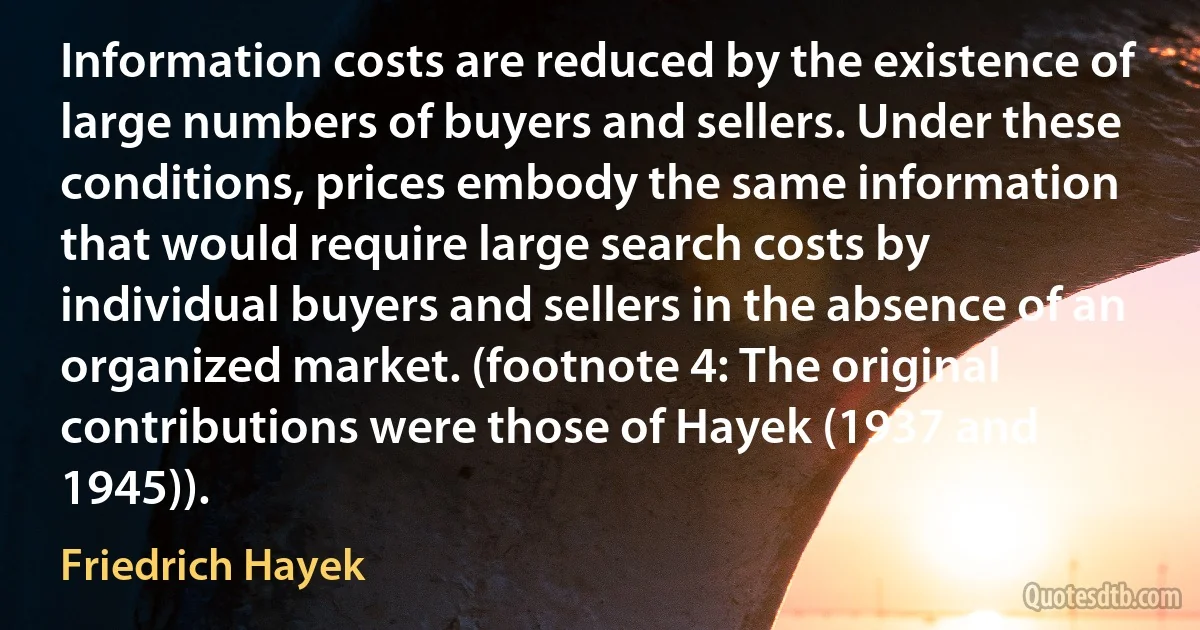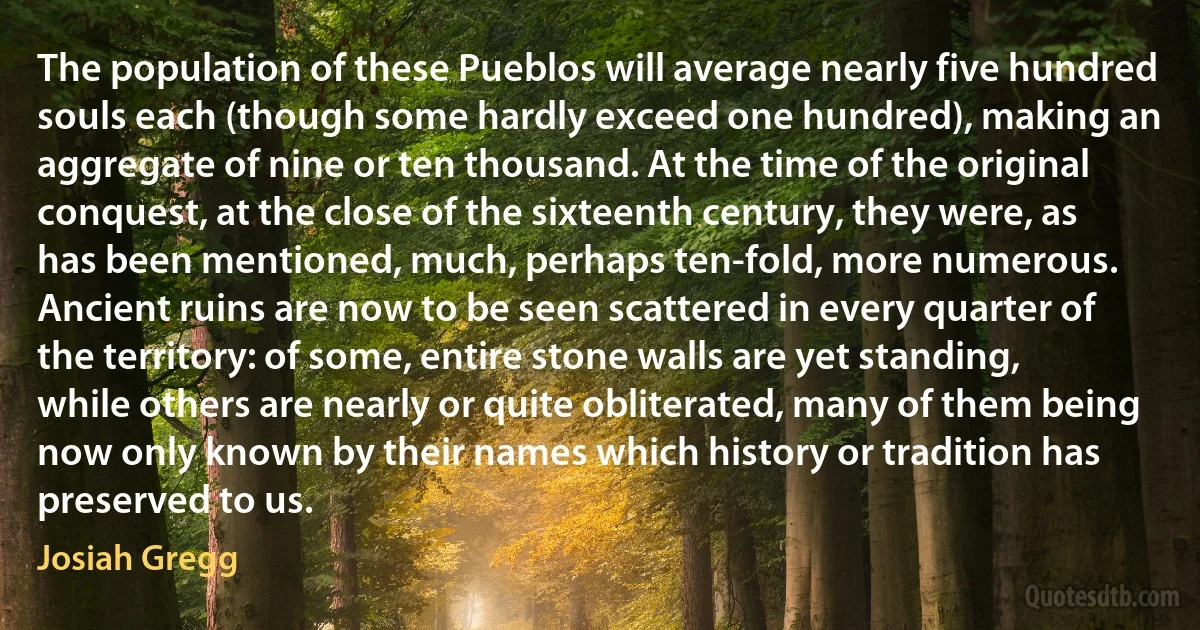Original Quotes - page 64
Luther's Qualifications. Luther had a rare combination of gifts for a Bible translator: familiarity with the original languages, perfect mastery over the vernacular, faith in the revealed word of God, enthusiasm for the gospel, unction of the Holy Spirit. A good translation must be both true and free, faithful and idiomatic, so as to read like an original work. This is the case with Luther's version. Besides, he had already acquired such fame and authority that his version at once commanded universal attention.

Philip Schaff
By what means this great and important alteration in the religious, moral, political, and social character of the people of thirteen colonies, all distinct, unconnected, and independent of each other, was begun, pursued, and accomplished, it is surely interesting to humanity to investigate, and perpetuate to posterity.
To this end, it is greatly to be desired, that young men of letters in all the States, especially in the thirteen original States, would undertake the laborious, but certainly interesting and amusing task, of searching and collecting all the records, pamphlets, newspapers, and even handbills, which in any way contributed to change the temper and views of the people, and compose them into an independent nation.

John Adams
Like a dropsical man calling out for water, water, our deluded citizens are clamoring for more banks, more banks. The American mind is now in that state of fever which the world has so often seen in the history of other nations. We are under the bank bubble, as England was under the South Sea bubble, France under the Mississippi bubble, and as every nation is liable to be, under whatever bubble, design, or delusion may puff up in moments when off their guard. We are now taught to believe that legerdemain tricks upon paper can produce as solid wealth as hard labor in the earth. It is vain for common sense to urge that nothing can produce nothing; that it is an idle dream to believe in a philosopher's stone which is to turn everything into gold, and to redeem man from the original sentence of his Maker, "in the sweat of his brow shall he eat his bread.”.

Thomas Jefferson
The "Schedule of Doctrines" of the most liberal Christian Church insists upon human depravity, and the "absolute need of the Holy Spirit's agency in man's regeneration and sanctification."
But what have we here? The "original calamity" was either caused by God or arose without leave of God, in either case degrading God to man. It is the old dilemma whose horns are the irreconcilable attributes of goodness and omniscience in the supposed Creator of sin and suffering. If the one quality be predicable, the other cannot be predicable of the same subject. Far better and wiser is the essayist's poetical explanation now apparently despised because it was the fashionable doctrine of the sage bard's day:-.

Richard Francis Burton
It is only in the CREATION that all our ideas and conceptions of a word of God can unite. [...] It is an ever existing original, which every man can read. It cannot be forged; it cannot be counterfeited; it cannot be lost; it cannot be altered; it cannot be suppressed. It does not depend upon the will of man whether it shall be published or not; it publishes itself from one end of the earth to the other.

Thomas Paine
What is a symbol? Etymologically speaking, the word σύμβολον comes from σνμβάλλω, to throw-with, to make something coincide with something else: a symbol was originally an identification mark made up of two halves of a coin or of a medal. Two halves of the same thing, either one standing for the other, both becoming, however, fully effective only when they matched to make up, again, the original whole. ... in the original concept of symbol, there is the suggestion of a final recomposition. Etymologies, however, do not necessarily tell the truth - or, at least, they tell the truth, in terms of historical, not of structural, semantics. What is frequently appreciated in many so-called symbols is exactly their vagueness, their openness, their fruitful ineffectiveness to express a 'final' meaning, so that with symbols and by symbols one indicates what is always beyond one's reach.

Umberto Eco
The source of the errors of these two sects, is in not having known that the state of man at the present time differs from that of his creation; so that the one, remarking some traces of his first greatness and being ignorant of his corruption, has treated nature as sound and without need of redemption, which leads him to the height of pride; whilst the other, feeling the present wretchedness and being ignorant of the original dignity, treats nature as necessarily infirm and irreparable, which precipitates it into despair of arriving at real good, and thence into extreme laxity.

Blaise Pascal
The years of childhood...My memory runs head-on into a scene that is like a symbol of those years. To me as I am today, that scene represents childhood itself, past and irrecoverable.When I saw the scene I felt the hand of farewell with which childhood would take its leave of me. I had a premonition at that instant that all my feeling of subjective time, or timelessness, might one day gush forth from within me and flood into the mold of that scene, to become an exact imitation of its people and movements and sounds; that simultaneous with the completion of this copy, the original might melt away into the distant perspectives of real and objective time;and that I might be left with nothing more than the mere imitation or, to say it another way, with nothing more than an accurately stuffed specimen of my childhood.

Yukio Mishima
"No human laws are of any validity if contrary to the law of nature; and such of them as are valid derive all their force and all their authority mediately or immediately from this original.” Thus writes Blackstone, to whom let all honour be given for having so far outseen the ideas of his time; and, indeed, we may say of our time. A good antidote, this, for those political superstitions which so widely prevail. A good check upon that sentiment of power-worship which still misleads us by magnifying the prerogatives of constitutional governments as it once did those of monarchs. Let men learn that a legislature is not "our God upon earth,” though, by the authority they ascribe to it, and the things they expect from it, they would seem to think it is. Let them learn rather that it is an institution serving a purely temporary purpose, whose power, when not stolen, is at the best borrowed.

Herbert Spencer
The regeneration of the inferior or bastard races by the superior ones is consistent with God's plans for humanity. The man of the people, in our countries, is always a fallen aristocrat; his hands are made to handle the sword rather than the laborer's tools. He prefers warring to working, that is, he returns to his original calling.

Ernest Renan
Castoriadis has given this tradition [the tradition of praxis philosophy] new life by introducing a unique linguistic turn. His work has a central place among the new departures in praxis philosophy that have evolved since the mid-1960s, especially in Eastern Europe (in Prague, Budapest, Zagreb, and Belgrade), and that for a decade enlivened the discussions at the Summer School of Korčula. It is the most original, ambitious, and reflective attempt to think through the liberating mediation of history, society, external and internal nature once again as praxis.

Cornelius Castoriadis
President Johnson, forgetting his own pre-war declaration that the "great plantations must be seized, and divided into small farms,” declared that this land must be restored to its original owners and this would be done if owners received a presidential pardon. The pardoning power was pushed and the land all over the South rapidly restored. Negroes were dispossessed.

W. E. B. Du Bois
Black Reconstruction is not the sort of book any scholar would want as the foundation of a new interpretive school. Du Bois was no historian. He consulted only limited sources and did no original archival research, an omission that "disturbed many scholars, several of whom dyspeptically noted the author's generous foundation support,” according to his biographer David Levering Lewis. The germ of the project was a dispute Du Bois had with the editors of Encyclopedia Britannica in 1929. They commissioned an entry on black history from him, which he withdrew when they asked him to delete some excessively rosy passages on Reconstruction. Obviously the Britannica editors wanted a racially progressive spin on history, or they would not have gone to Du Bois. But there is a line between creative reinterpretation and outright fantasy, and in their professional opinion, Du Bois had crossed it.

W. E. B. Du Bois
For centuries we have been spoon-fed by our teachers, by our authorities, by our books, our saints. We say, "Tell me all about it - what lies beyond the hills and the mountains and the earth?" and we are satisfied with their descriptions, which means that we live on words and our life is shallow and empty. We are secondhand people. We have lived on what we have been told, either guided by our inclinations, our tendencies, or compelled to accept by circumstances and environment. We are the result of all kinds of influences and there is nothing new in us, nothing that we have discovered for ourselves; nothing original, pristine, clear.

Jiddu Krishnamurti
I think that the fun of telling stories in this galaxy is that you get to take things that are familiar and you get to adjust them, augment them, comment on them, continue them. It's a world that is looking to be expanded. I mean, the original movies did the most remarkable thing in referencing the Clone Wars and the Empire and the Senate, and the Old Wars, and never showing any of these things. But the painting that was created of this past canvas, it's incredible how intimate it was. But you always felt that there was a peripheral life and history and world beyond what you were seeing.

J. J. Abrams



